Impact of Work Culture on Employee Retention in UK Retail: Sainsbury's
VerifiedAdded on 2023/06/18
|14
|3638
|337
Report
AI Summary
This report explores the impact of work culture on employee retention within the UK retail sector, focusing on Sainsbury's. It begins by defining work culture and its significance, highlighting its role in shaping the working environment and influencing employee motivation and teamwork. The research objectives include understanding the importance of work culture, identifying factors affecting it, analyzing its impact on employee retention at Sainsbury's, and suggesting strategies for improvement. The literature review examines various themes, including the importance of work culture, factors influencing it (such as leadership, ethics, and work-life balance), and the positive (job satisfaction, teamwork) and negative (discrimination, increased turnover) impacts on employee retention. The report also outlines the research methodology, including the timeline and Gantt chart, to provide a structured approach to the study. Ultimately, the report aims to provide insights into how Sainsbury's and other companies can enhance their work culture to improve employee retention and overall organizational performance.

TITLE
Paraphrase This Document
Need a fresh take? Get an instant paraphrase of this document with our AI Paraphraser
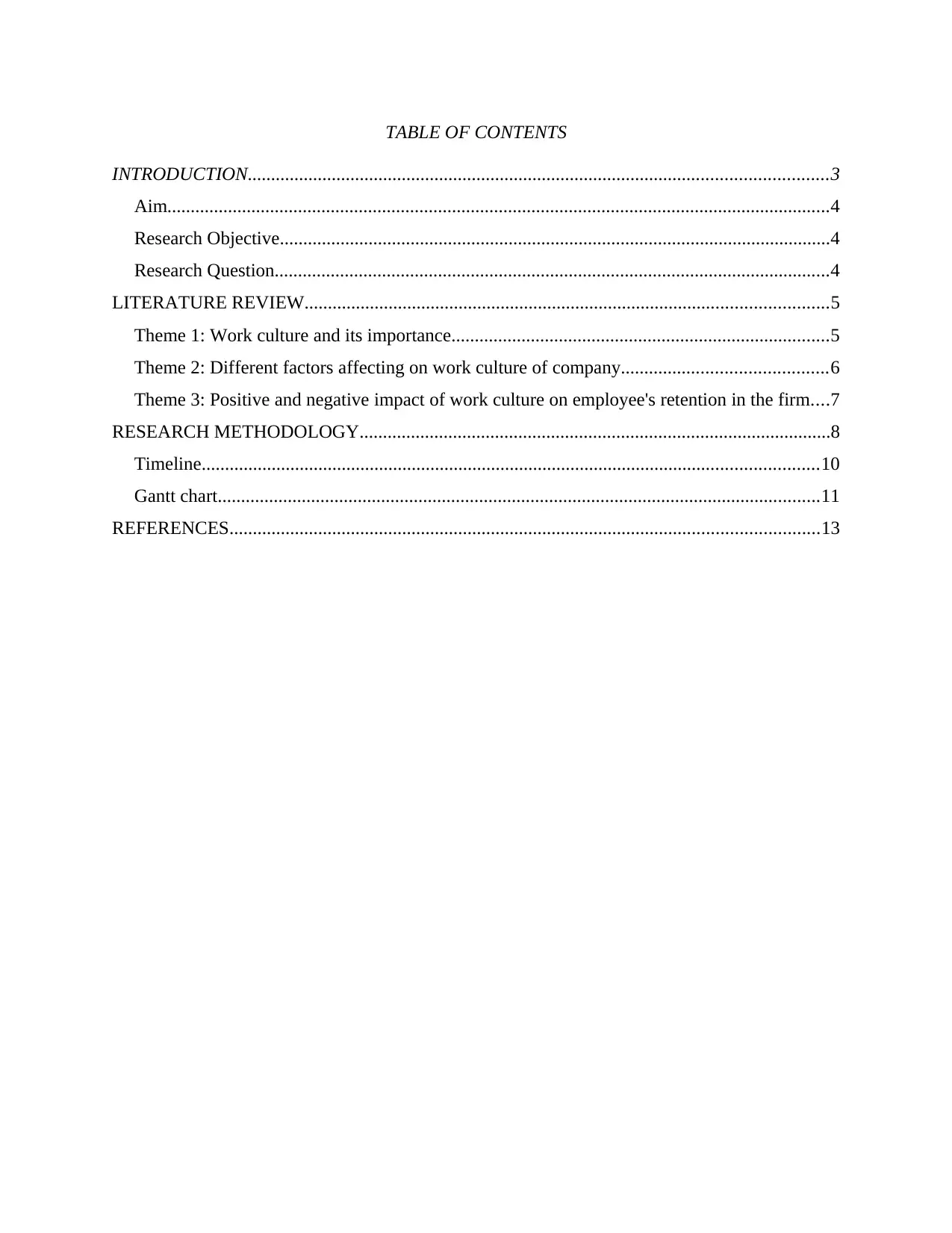
TABLE OF CONTENTS
INTRODUCTION............................................................................................................................3
Aim..............................................................................................................................................4
Research Objective......................................................................................................................4
Research Question.......................................................................................................................4
LITERATURE REVIEW................................................................................................................5
Theme 1: Work culture and its importance.................................................................................5
Theme 2: Different factors affecting on work culture of company............................................6
Theme 3: Positive and negative impact of work culture on employee's retention in the firm....7
RESEARCH METHODOLOGY.....................................................................................................8
Timeline....................................................................................................................................10
Gantt chart.................................................................................................................................11
REFERENCES..............................................................................................................................13
INTRODUCTION............................................................................................................................3
Aim..............................................................................................................................................4
Research Objective......................................................................................................................4
Research Question.......................................................................................................................4
LITERATURE REVIEW................................................................................................................5
Theme 1: Work culture and its importance.................................................................................5
Theme 2: Different factors affecting on work culture of company............................................6
Theme 3: Positive and negative impact of work culture on employee's retention in the firm....7
RESEARCH METHODOLOGY.....................................................................................................8
Timeline....................................................................................................................................10
Gantt chart.................................................................................................................................11
REFERENCES..............................................................................................................................13
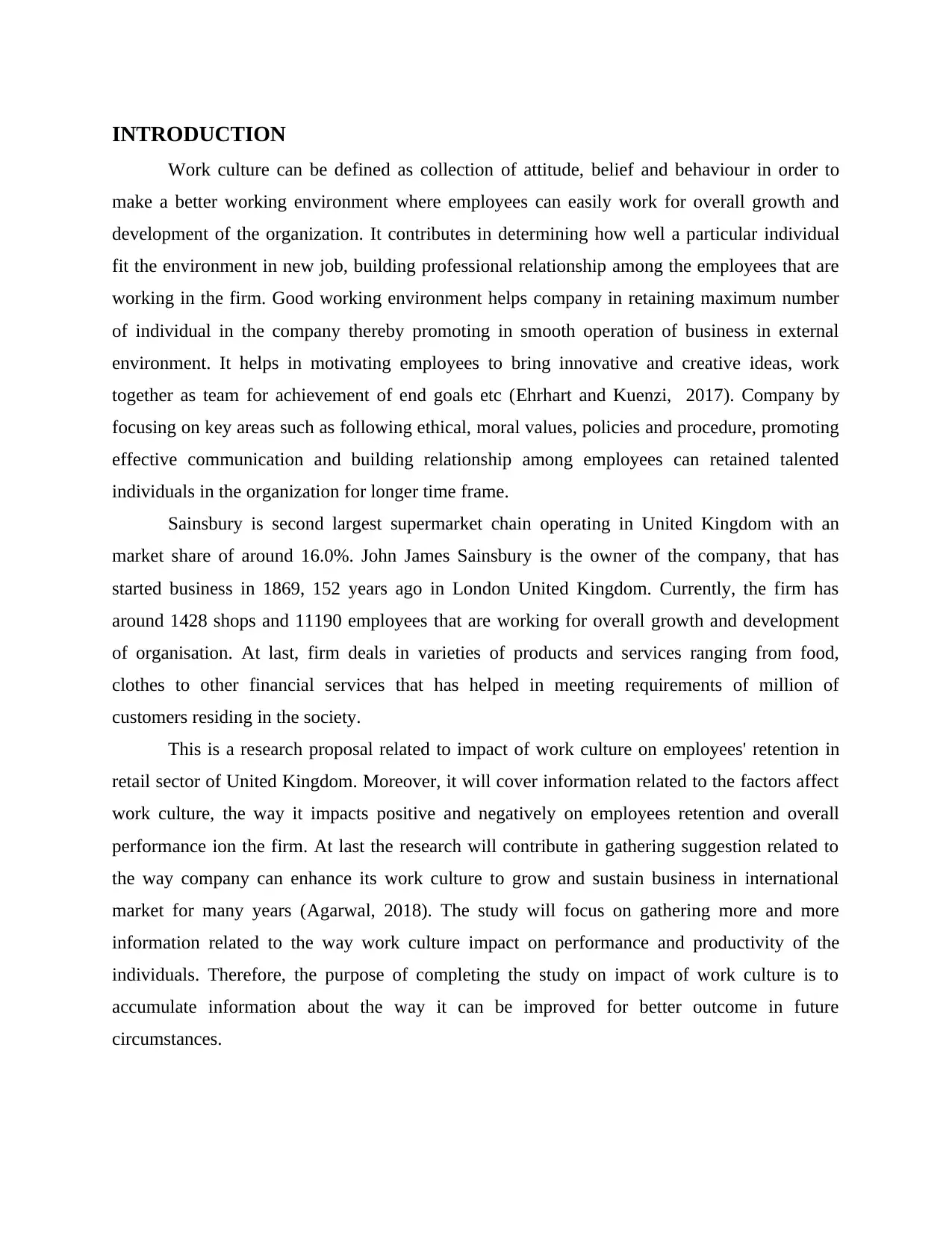
INTRODUCTION
Work culture can be defined as collection of attitude, belief and behaviour in order to
make a better working environment where employees can easily work for overall growth and
development of the organization. It contributes in determining how well a particular individual
fit the environment in new job, building professional relationship among the employees that are
working in the firm. Good working environment helps company in retaining maximum number
of individual in the company thereby promoting in smooth operation of business in external
environment. It helps in motivating employees to bring innovative and creative ideas, work
together as team for achievement of end goals etc (Ehrhart and Kuenzi, 2017). Company by
focusing on key areas such as following ethical, moral values, policies and procedure, promoting
effective communication and building relationship among employees can retained talented
individuals in the organization for longer time frame.
Sainsbury is second largest supermarket chain operating in United Kingdom with an
market share of around 16.0%. John James Sainsbury is the owner of the company, that has
started business in 1869, 152 years ago in London United Kingdom. Currently, the firm has
around 1428 shops and 11190 employees that are working for overall growth and development
of organisation. At last, firm deals in varieties of products and services ranging from food,
clothes to other financial services that has helped in meeting requirements of million of
customers residing in the society.
This is a research proposal related to impact of work culture on employees' retention in
retail sector of United Kingdom. Moreover, it will cover information related to the factors affect
work culture, the way it impacts positive and negatively on employees retention and overall
performance ion the firm. At last the research will contribute in gathering suggestion related to
the way company can enhance its work culture to grow and sustain business in international
market for many years (Agarwal, 2018). The study will focus on gathering more and more
information related to the way work culture impact on performance and productivity of the
individuals. Therefore, the purpose of completing the study on impact of work culture is to
accumulate information about the way it can be improved for better outcome in future
circumstances.
Work culture can be defined as collection of attitude, belief and behaviour in order to
make a better working environment where employees can easily work for overall growth and
development of the organization. It contributes in determining how well a particular individual
fit the environment in new job, building professional relationship among the employees that are
working in the firm. Good working environment helps company in retaining maximum number
of individual in the company thereby promoting in smooth operation of business in external
environment. It helps in motivating employees to bring innovative and creative ideas, work
together as team for achievement of end goals etc (Ehrhart and Kuenzi, 2017). Company by
focusing on key areas such as following ethical, moral values, policies and procedure, promoting
effective communication and building relationship among employees can retained talented
individuals in the organization for longer time frame.
Sainsbury is second largest supermarket chain operating in United Kingdom with an
market share of around 16.0%. John James Sainsbury is the owner of the company, that has
started business in 1869, 152 years ago in London United Kingdom. Currently, the firm has
around 1428 shops and 11190 employees that are working for overall growth and development
of organisation. At last, firm deals in varieties of products and services ranging from food,
clothes to other financial services that has helped in meeting requirements of million of
customers residing in the society.
This is a research proposal related to impact of work culture on employees' retention in
retail sector of United Kingdom. Moreover, it will cover information related to the factors affect
work culture, the way it impacts positive and negatively on employees retention and overall
performance ion the firm. At last the research will contribute in gathering suggestion related to
the way company can enhance its work culture to grow and sustain business in international
market for many years (Agarwal, 2018). The study will focus on gathering more and more
information related to the way work culture impact on performance and productivity of the
individuals. Therefore, the purpose of completing the study on impact of work culture is to
accumulate information about the way it can be improved for better outcome in future
circumstances.
⊘ This is a preview!⊘
Do you want full access?
Subscribe today to unlock all pages.

Trusted by 1+ million students worldwide
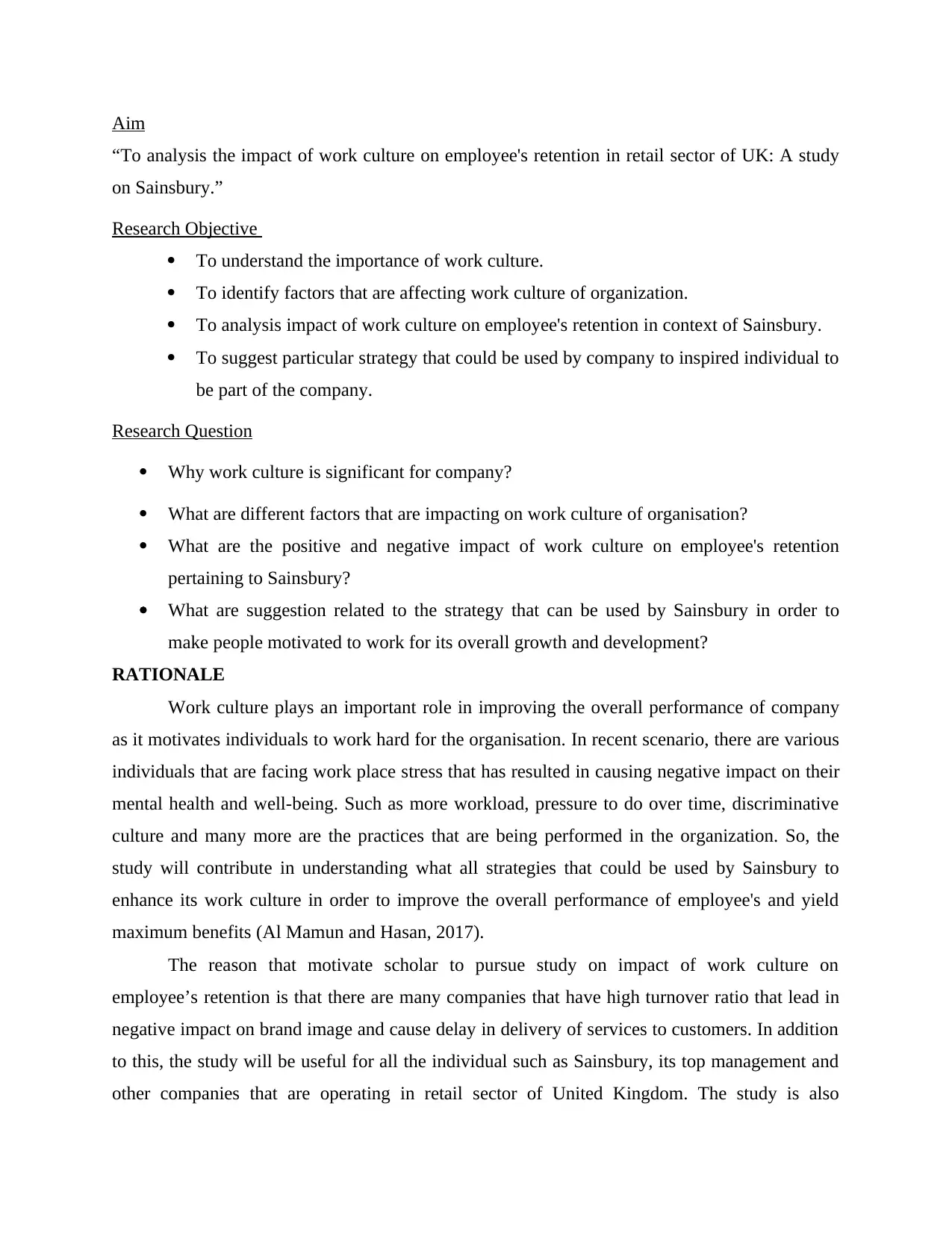
Aim
“To analysis the impact of work culture on employee's retention in retail sector of UK: A study
on Sainsbury.”
Research Objective
To understand the importance of work culture.
To identify factors that are affecting work culture of organization.
To analysis impact of work culture on employee's retention in context of Sainsbury.
To suggest particular strategy that could be used by company to inspired individual to
be part of the company.
Research Question
Why work culture is significant for company?
What are different factors that are impacting on work culture of organisation?
What are the positive and negative impact of work culture on employee's retention
pertaining to Sainsbury?
What are suggestion related to the strategy that can be used by Sainsbury in order to
make people motivated to work for its overall growth and development?
RATIONALE
Work culture plays an important role in improving the overall performance of company
as it motivates individuals to work hard for the organisation. In recent scenario, there are various
individuals that are facing work place stress that has resulted in causing negative impact on their
mental health and well-being. Such as more workload, pressure to do over time, discriminative
culture and many more are the practices that are being performed in the organization. So, the
study will contribute in understanding what all strategies that could be used by Sainsbury to
enhance its work culture in order to improve the overall performance of employee's and yield
maximum benefits (Al Mamun and Hasan, 2017).
The reason that motivate scholar to pursue study on impact of work culture on
employee’s retention is that there are many companies that have high turnover ratio that lead in
negative impact on brand image and cause delay in delivery of services to customers. In addition
to this, the study will be useful for all the individual such as Sainsbury, its top management and
other companies that are operating in retail sector of United Kingdom. The study is also
“To analysis the impact of work culture on employee's retention in retail sector of UK: A study
on Sainsbury.”
Research Objective
To understand the importance of work culture.
To identify factors that are affecting work culture of organization.
To analysis impact of work culture on employee's retention in context of Sainsbury.
To suggest particular strategy that could be used by company to inspired individual to
be part of the company.
Research Question
Why work culture is significant for company?
What are different factors that are impacting on work culture of organisation?
What are the positive and negative impact of work culture on employee's retention
pertaining to Sainsbury?
What are suggestion related to the strategy that can be used by Sainsbury in order to
make people motivated to work for its overall growth and development?
RATIONALE
Work culture plays an important role in improving the overall performance of company
as it motivates individuals to work hard for the organisation. In recent scenario, there are various
individuals that are facing work place stress that has resulted in causing negative impact on their
mental health and well-being. Such as more workload, pressure to do over time, discriminative
culture and many more are the practices that are being performed in the organization. So, the
study will contribute in understanding what all strategies that could be used by Sainsbury to
enhance its work culture in order to improve the overall performance of employee's and yield
maximum benefits (Al Mamun and Hasan, 2017).
The reason that motivate scholar to pursue study on impact of work culture on
employee’s retention is that there are many companies that have high turnover ratio that lead in
negative impact on brand image and cause delay in delivery of services to customers. In addition
to this, the study will be useful for all the individual such as Sainsbury, its top management and
other companies that are operating in retail sector of United Kingdom. The study is also
Paraphrase This Document
Need a fresh take? Get an instant paraphrase of this document with our AI Paraphraser
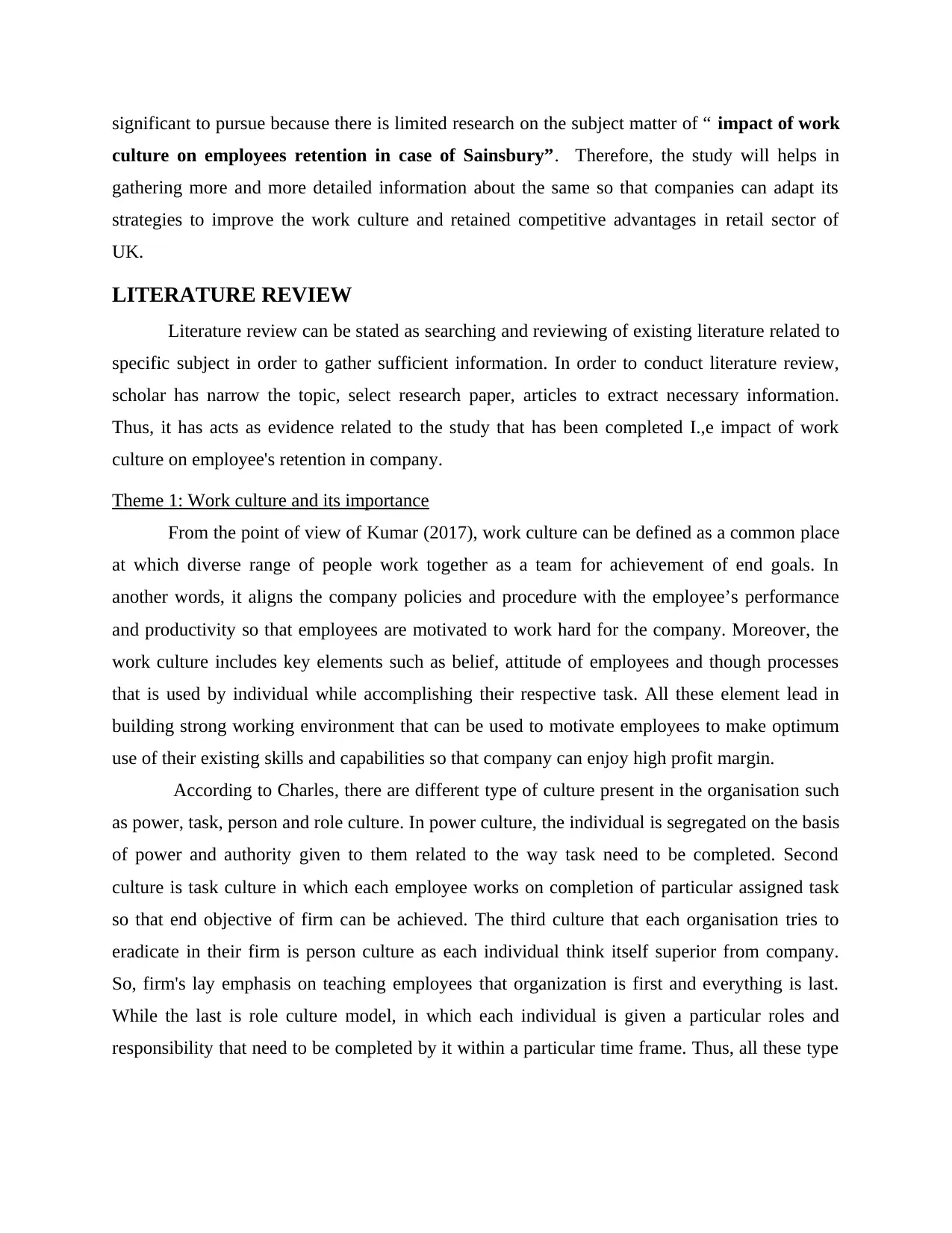
significant to pursue because there is limited research on the subject matter of “ impact of work
culture on employees retention in case of Sainsbury”. Therefore, the study will helps in
gathering more and more detailed information about the same so that companies can adapt its
strategies to improve the work culture and retained competitive advantages in retail sector of
UK.
LITERATURE REVIEW
Literature review can be stated as searching and reviewing of existing literature related to
specific subject in order to gather sufficient information. In order to conduct literature review,
scholar has narrow the topic, select research paper, articles to extract necessary information.
Thus, it has acts as evidence related to the study that has been completed I.,e impact of work
culture on employee's retention in company.
Theme 1: Work culture and its importance
From the point of view of Kumar (2017), work culture can be defined as a common place
at which diverse range of people work together as a team for achievement of end goals. In
another words, it aligns the company policies and procedure with the employee’s performance
and productivity so that employees are motivated to work hard for the company. Moreover, the
work culture includes key elements such as belief, attitude of employees and though processes
that is used by individual while accomplishing their respective task. All these element lead in
building strong working environment that can be used to motivate employees to make optimum
use of their existing skills and capabilities so that company can enjoy high profit margin.
According to Charles, there are different type of culture present in the organisation such
as power, task, person and role culture. In power culture, the individual is segregated on the basis
of power and authority given to them related to the way task need to be completed. Second
culture is task culture in which each employee works on completion of particular assigned task
so that end objective of firm can be achieved. The third culture that each organisation tries to
eradicate in their firm is person culture as each individual think itself superior from company.
So, firm's lay emphasis on teaching employees that organization is first and everything is last.
While the last is role culture model, in which each individual is given a particular roles and
responsibility that need to be completed by it within a particular time frame. Thus, all these type
culture on employees retention in case of Sainsbury”. Therefore, the study will helps in
gathering more and more detailed information about the same so that companies can adapt its
strategies to improve the work culture and retained competitive advantages in retail sector of
UK.
LITERATURE REVIEW
Literature review can be stated as searching and reviewing of existing literature related to
specific subject in order to gather sufficient information. In order to conduct literature review,
scholar has narrow the topic, select research paper, articles to extract necessary information.
Thus, it has acts as evidence related to the study that has been completed I.,e impact of work
culture on employee's retention in company.
Theme 1: Work culture and its importance
From the point of view of Kumar (2017), work culture can be defined as a common place
at which diverse range of people work together as a team for achievement of end goals. In
another words, it aligns the company policies and procedure with the employee’s performance
and productivity so that employees are motivated to work hard for the company. Moreover, the
work culture includes key elements such as belief, attitude of employees and though processes
that is used by individual while accomplishing their respective task. All these element lead in
building strong working environment that can be used to motivate employees to make optimum
use of their existing skills and capabilities so that company can enjoy high profit margin.
According to Charles, there are different type of culture present in the organisation such
as power, task, person and role culture. In power culture, the individual is segregated on the basis
of power and authority given to them related to the way task need to be completed. Second
culture is task culture in which each employee works on completion of particular assigned task
so that end objective of firm can be achieved. The third culture that each organisation tries to
eradicate in their firm is person culture as each individual think itself superior from company.
So, firm's lay emphasis on teaching employees that organization is first and everything is last.
While the last is role culture model, in which each individual is given a particular roles and
responsibility that need to be completed by it within a particular time frame. Thus, all these type
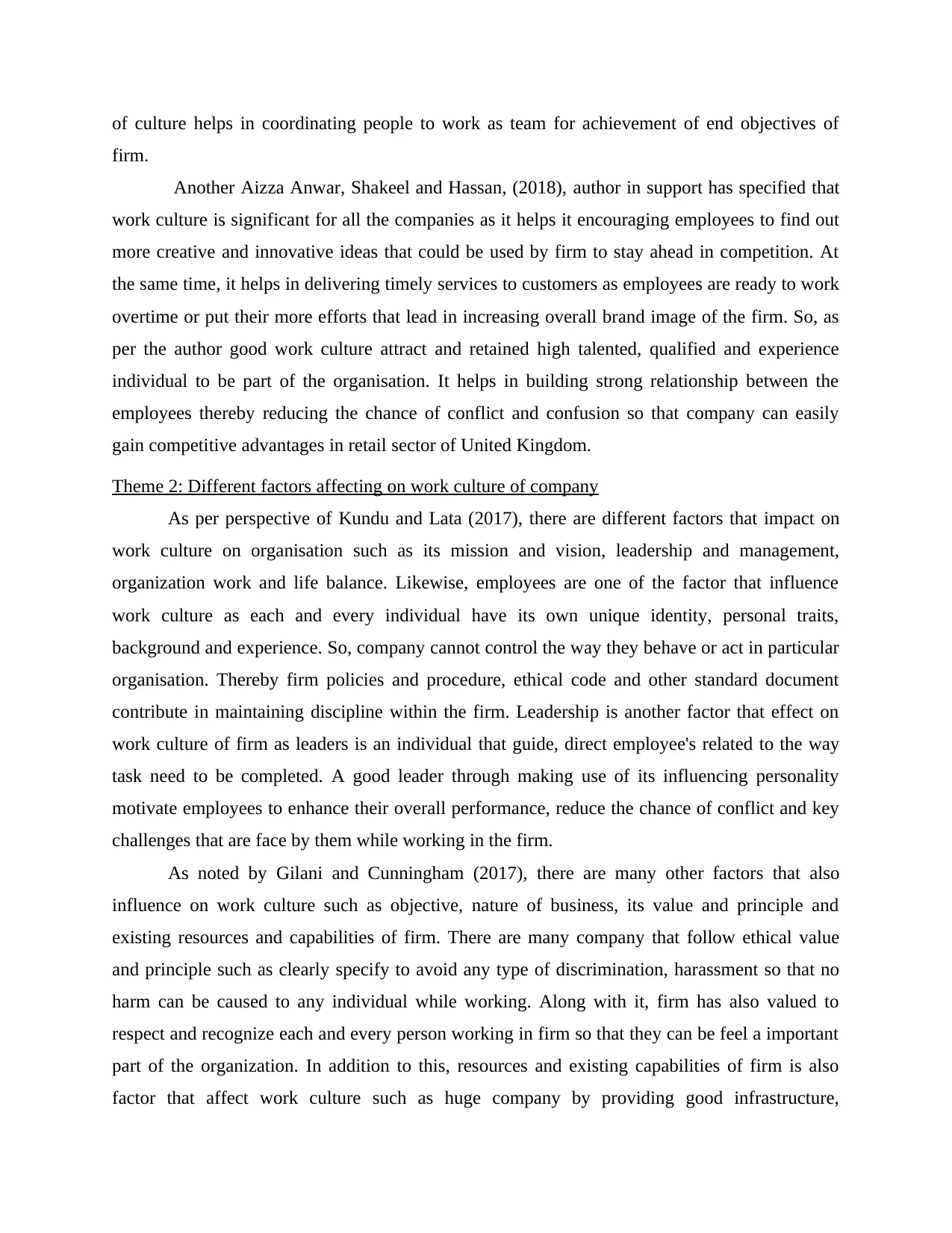
of culture helps in coordinating people to work as team for achievement of end objectives of
firm.
Another Aizza Anwar, Shakeel and Hassan, (2018), author in support has specified that
work culture is significant for all the companies as it helps it encouraging employees to find out
more creative and innovative ideas that could be used by firm to stay ahead in competition. At
the same time, it helps in delivering timely services to customers as employees are ready to work
overtime or put their more efforts that lead in increasing overall brand image of the firm. So, as
per the author good work culture attract and retained high talented, qualified and experience
individual to be part of the organisation. It helps in building strong relationship between the
employees thereby reducing the chance of conflict and confusion so that company can easily
gain competitive advantages in retail sector of United Kingdom.
Theme 2: Different factors affecting on work culture of company
As per perspective of Kundu and Lata (2017), there are different factors that impact on
work culture on organisation such as its mission and vision, leadership and management,
organization work and life balance. Likewise, employees are one of the factor that influence
work culture as each and every individual have its own unique identity, personal traits,
background and experience. So, company cannot control the way they behave or act in particular
organisation. Thereby firm policies and procedure, ethical code and other standard document
contribute in maintaining discipline within the firm. Leadership is another factor that effect on
work culture of firm as leaders is an individual that guide, direct employee's related to the way
task need to be completed. A good leader through making use of its influencing personality
motivate employees to enhance their overall performance, reduce the chance of conflict and key
challenges that are face by them while working in the firm.
As noted by Gilani and Cunningham (2017), there are many other factors that also
influence on work culture such as objective, nature of business, its value and principle and
existing resources and capabilities of firm. There are many company that follow ethical value
and principle such as clearly specify to avoid any type of discrimination, harassment so that no
harm can be caused to any individual while working. Along with it, firm has also valued to
respect and recognize each and every person working in firm so that they can be feel a important
part of the organization. In addition to this, resources and existing capabilities of firm is also
factor that affect work culture such as huge company by providing good infrastructure,
firm.
Another Aizza Anwar, Shakeel and Hassan, (2018), author in support has specified that
work culture is significant for all the companies as it helps it encouraging employees to find out
more creative and innovative ideas that could be used by firm to stay ahead in competition. At
the same time, it helps in delivering timely services to customers as employees are ready to work
overtime or put their more efforts that lead in increasing overall brand image of the firm. So, as
per the author good work culture attract and retained high talented, qualified and experience
individual to be part of the organisation. It helps in building strong relationship between the
employees thereby reducing the chance of conflict and confusion so that company can easily
gain competitive advantages in retail sector of United Kingdom.
Theme 2: Different factors affecting on work culture of company
As per perspective of Kundu and Lata (2017), there are different factors that impact on
work culture on organisation such as its mission and vision, leadership and management,
organization work and life balance. Likewise, employees are one of the factor that influence
work culture as each and every individual have its own unique identity, personal traits,
background and experience. So, company cannot control the way they behave or act in particular
organisation. Thereby firm policies and procedure, ethical code and other standard document
contribute in maintaining discipline within the firm. Leadership is another factor that effect on
work culture of firm as leaders is an individual that guide, direct employee's related to the way
task need to be completed. A good leader through making use of its influencing personality
motivate employees to enhance their overall performance, reduce the chance of conflict and key
challenges that are face by them while working in the firm.
As noted by Gilani and Cunningham (2017), there are many other factors that also
influence on work culture such as objective, nature of business, its value and principle and
existing resources and capabilities of firm. There are many company that follow ethical value
and principle such as clearly specify to avoid any type of discrimination, harassment so that no
harm can be caused to any individual while working. Along with it, firm has also valued to
respect and recognize each and every person working in firm so that they can be feel a important
part of the organization. In addition to this, resources and existing capabilities of firm is also
factor that affect work culture such as huge company by providing good infrastructure,
⊘ This is a preview!⊘
Do you want full access?
Subscribe today to unlock all pages.

Trusted by 1+ million students worldwide
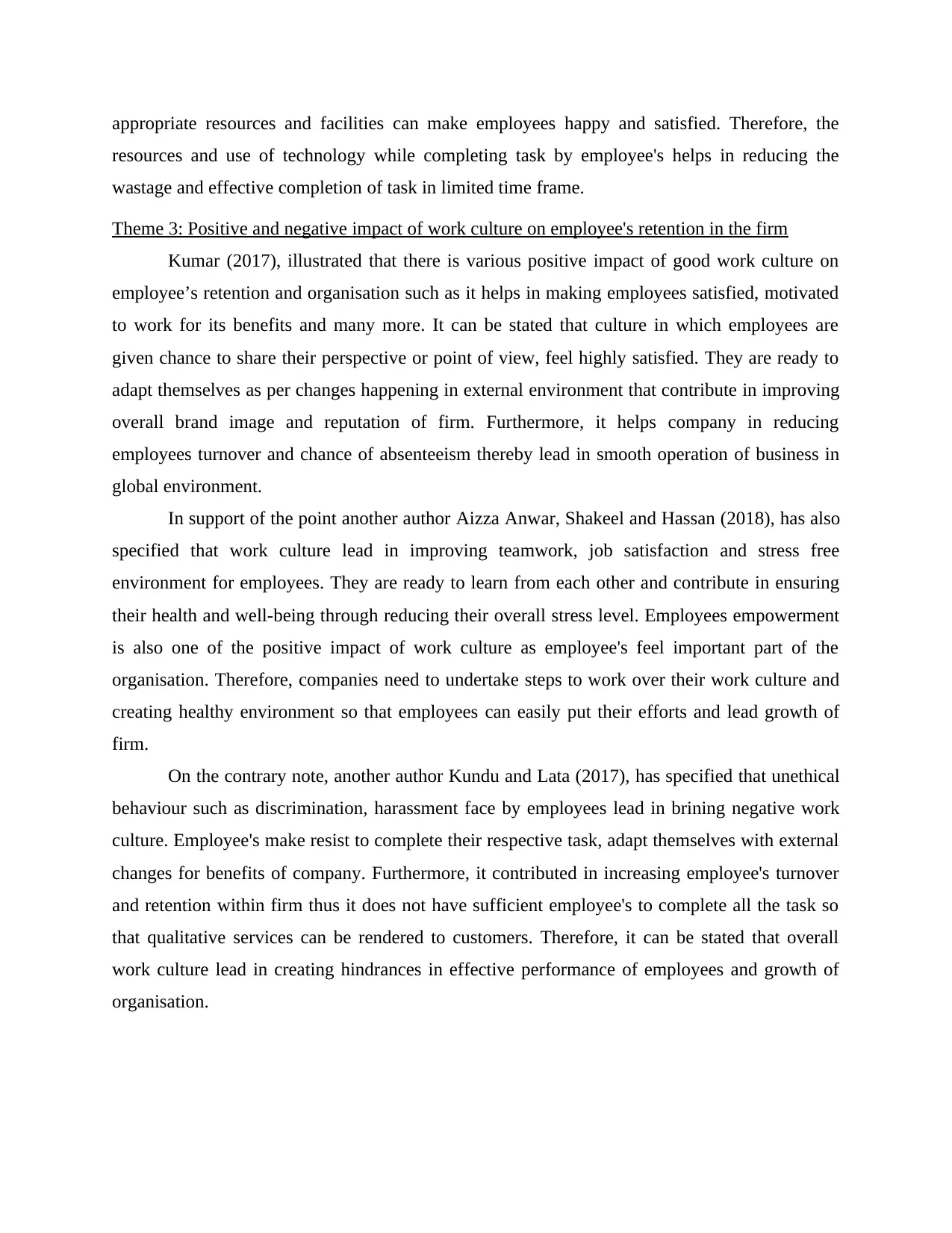
appropriate resources and facilities can make employees happy and satisfied. Therefore, the
resources and use of technology while completing task by employee's helps in reducing the
wastage and effective completion of task in limited time frame.
Theme 3: Positive and negative impact of work culture on employee's retention in the firm
Kumar (2017), illustrated that there is various positive impact of good work culture on
employee’s retention and organisation such as it helps in making employees satisfied, motivated
to work for its benefits and many more. It can be stated that culture in which employees are
given chance to share their perspective or point of view, feel highly satisfied. They are ready to
adapt themselves as per changes happening in external environment that contribute in improving
overall brand image and reputation of firm. Furthermore, it helps company in reducing
employees turnover and chance of absenteeism thereby lead in smooth operation of business in
global environment.
In support of the point another author Aizza Anwar, Shakeel and Hassan (2018), has also
specified that work culture lead in improving teamwork, job satisfaction and stress free
environment for employees. They are ready to learn from each other and contribute in ensuring
their health and well-being through reducing their overall stress level. Employees empowerment
is also one of the positive impact of work culture as employee's feel important part of the
organisation. Therefore, companies need to undertake steps to work over their work culture and
creating healthy environment so that employees can easily put their efforts and lead growth of
firm.
On the contrary note, another author Kundu and Lata (2017), has specified that unethical
behaviour such as discrimination, harassment face by employees lead in brining negative work
culture. Employee's make resist to complete their respective task, adapt themselves with external
changes for benefits of company. Furthermore, it contributed in increasing employee's turnover
and retention within firm thus it does not have sufficient employee's to complete all the task so
that qualitative services can be rendered to customers. Therefore, it can be stated that overall
work culture lead in creating hindrances in effective performance of employees and growth of
organisation.
resources and use of technology while completing task by employee's helps in reducing the
wastage and effective completion of task in limited time frame.
Theme 3: Positive and negative impact of work culture on employee's retention in the firm
Kumar (2017), illustrated that there is various positive impact of good work culture on
employee’s retention and organisation such as it helps in making employees satisfied, motivated
to work for its benefits and many more. It can be stated that culture in which employees are
given chance to share their perspective or point of view, feel highly satisfied. They are ready to
adapt themselves as per changes happening in external environment that contribute in improving
overall brand image and reputation of firm. Furthermore, it helps company in reducing
employees turnover and chance of absenteeism thereby lead in smooth operation of business in
global environment.
In support of the point another author Aizza Anwar, Shakeel and Hassan (2018), has also
specified that work culture lead in improving teamwork, job satisfaction and stress free
environment for employees. They are ready to learn from each other and contribute in ensuring
their health and well-being through reducing their overall stress level. Employees empowerment
is also one of the positive impact of work culture as employee's feel important part of the
organisation. Therefore, companies need to undertake steps to work over their work culture and
creating healthy environment so that employees can easily put their efforts and lead growth of
firm.
On the contrary note, another author Kundu and Lata (2017), has specified that unethical
behaviour such as discrimination, harassment face by employees lead in brining negative work
culture. Employee's make resist to complete their respective task, adapt themselves with external
changes for benefits of company. Furthermore, it contributed in increasing employee's turnover
and retention within firm thus it does not have sufficient employee's to complete all the task so
that qualitative services can be rendered to customers. Therefore, it can be stated that overall
work culture lead in creating hindrances in effective performance of employees and growth of
organisation.
Paraphrase This Document
Need a fresh take? Get an instant paraphrase of this document with our AI Paraphraser
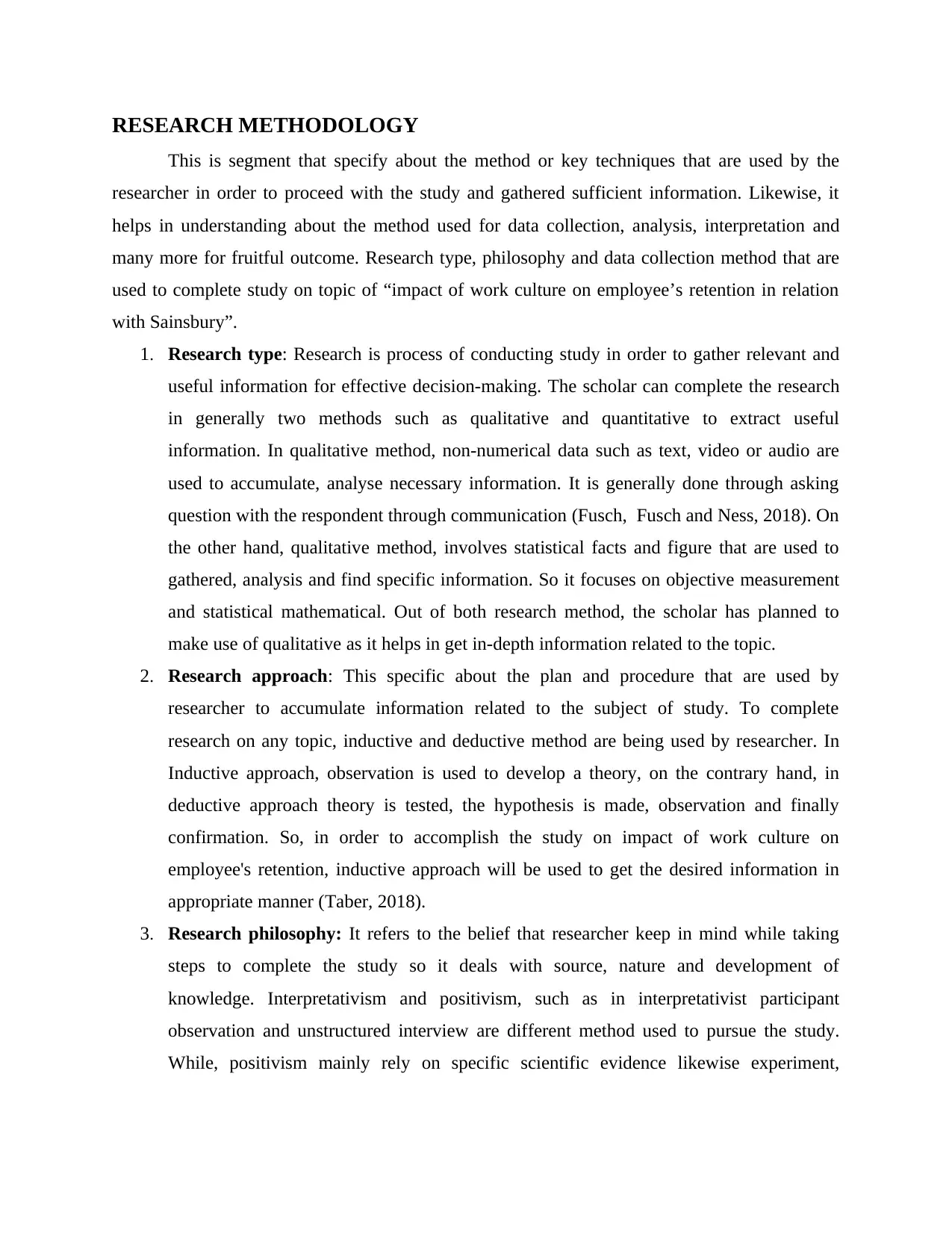
RESEARCH METHODOLOGY
This is segment that specify about the method or key techniques that are used by the
researcher in order to proceed with the study and gathered sufficient information. Likewise, it
helps in understanding about the method used for data collection, analysis, interpretation and
many more for fruitful outcome. Research type, philosophy and data collection method that are
used to complete study on topic of “impact of work culture on employee’s retention in relation
with Sainsbury”.
1. Research type: Research is process of conducting study in order to gather relevant and
useful information for effective decision-making. The scholar can complete the research
in generally two methods such as qualitative and quantitative to extract useful
information. In qualitative method, non-numerical data such as text, video or audio are
used to accumulate, analyse necessary information. It is generally done through asking
question with the respondent through communication (Fusch, Fusch and Ness, 2018). On
the other hand, qualitative method, involves statistical facts and figure that are used to
gathered, analysis and find specific information. So it focuses on objective measurement
and statistical mathematical. Out of both research method, the scholar has planned to
make use of qualitative as it helps in get in-depth information related to the topic.
2. Research approach: This specific about the plan and procedure that are used by
researcher to accumulate information related to the subject of study. To complete
research on any topic, inductive and deductive method are being used by researcher. In
Inductive approach, observation is used to develop a theory, on the contrary hand, in
deductive approach theory is tested, the hypothesis is made, observation and finally
confirmation. So, in order to accomplish the study on impact of work culture on
employee's retention, inductive approach will be used to get the desired information in
appropriate manner (Taber, 2018).
3. Research philosophy: It refers to the belief that researcher keep in mind while taking
steps to complete the study so it deals with source, nature and development of
knowledge. Interpretativism and positivism, such as in interpretativist participant
observation and unstructured interview are different method used to pursue the study.
While, positivism mainly rely on specific scientific evidence likewise experiment,
This is segment that specify about the method or key techniques that are used by the
researcher in order to proceed with the study and gathered sufficient information. Likewise, it
helps in understanding about the method used for data collection, analysis, interpretation and
many more for fruitful outcome. Research type, philosophy and data collection method that are
used to complete study on topic of “impact of work culture on employee’s retention in relation
with Sainsbury”.
1. Research type: Research is process of conducting study in order to gather relevant and
useful information for effective decision-making. The scholar can complete the research
in generally two methods such as qualitative and quantitative to extract useful
information. In qualitative method, non-numerical data such as text, video or audio are
used to accumulate, analyse necessary information. It is generally done through asking
question with the respondent through communication (Fusch, Fusch and Ness, 2018). On
the other hand, qualitative method, involves statistical facts and figure that are used to
gathered, analysis and find specific information. So it focuses on objective measurement
and statistical mathematical. Out of both research method, the scholar has planned to
make use of qualitative as it helps in get in-depth information related to the topic.
2. Research approach: This specific about the plan and procedure that are used by
researcher to accumulate information related to the subject of study. To complete
research on any topic, inductive and deductive method are being used by researcher. In
Inductive approach, observation is used to develop a theory, on the contrary hand, in
deductive approach theory is tested, the hypothesis is made, observation and finally
confirmation. So, in order to accomplish the study on impact of work culture on
employee's retention, inductive approach will be used to get the desired information in
appropriate manner (Taber, 2018).
3. Research philosophy: It refers to the belief that researcher keep in mind while taking
steps to complete the study so it deals with source, nature and development of
knowledge. Interpretativism and positivism, such as in interpretativist participant
observation and unstructured interview are different method used to pursue the study.
While, positivism mainly rely on specific scientific evidence likewise experiment,
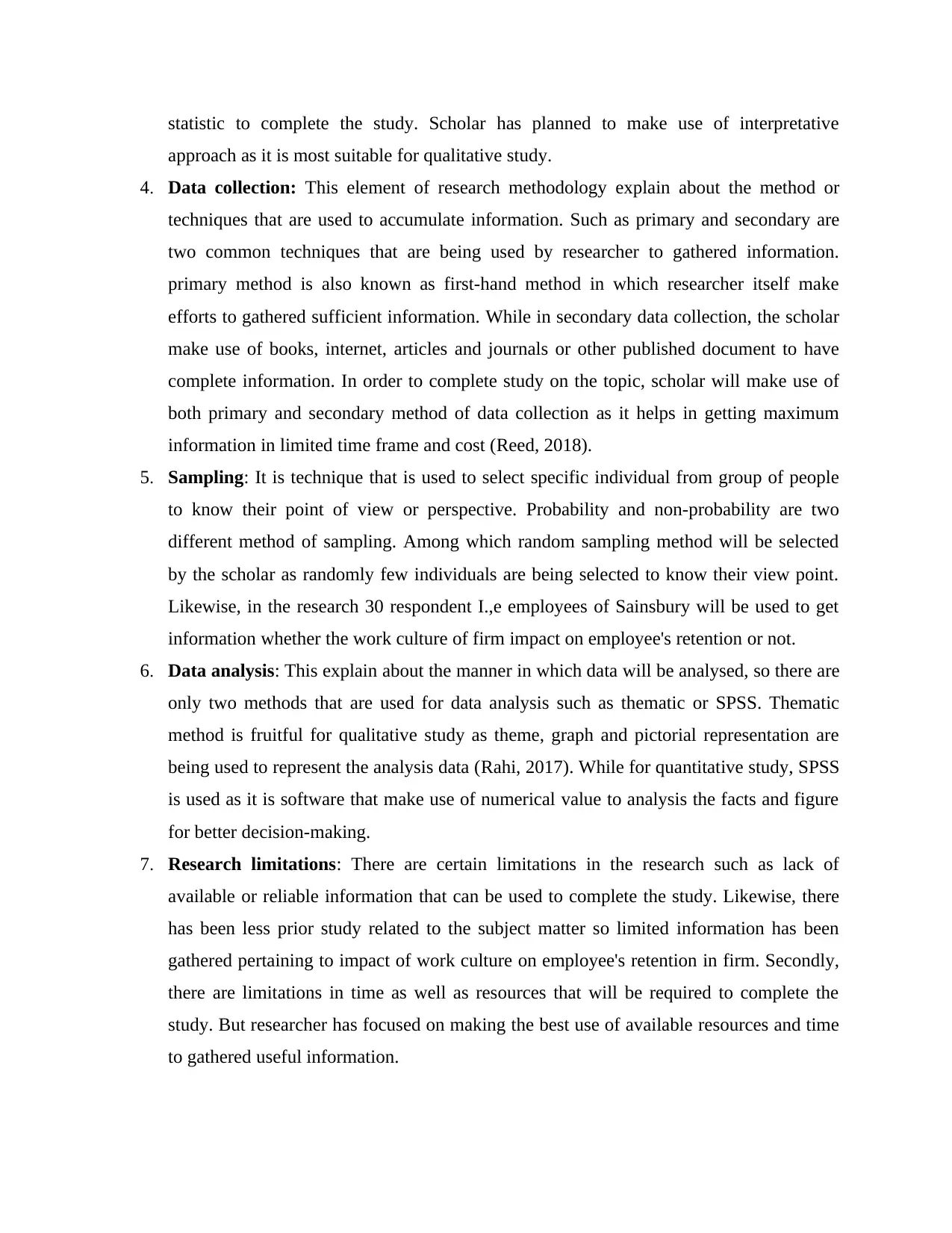
statistic to complete the study. Scholar has planned to make use of interpretative
approach as it is most suitable for qualitative study.
4. Data collection: This element of research methodology explain about the method or
techniques that are used to accumulate information. Such as primary and secondary are
two common techniques that are being used by researcher to gathered information.
primary method is also known as first-hand method in which researcher itself make
efforts to gathered sufficient information. While in secondary data collection, the scholar
make use of books, internet, articles and journals or other published document to have
complete information. In order to complete study on the topic, scholar will make use of
both primary and secondary method of data collection as it helps in getting maximum
information in limited time frame and cost (Reed, 2018).
5. Sampling: It is technique that is used to select specific individual from group of people
to know their point of view or perspective. Probability and non-probability are two
different method of sampling. Among which random sampling method will be selected
by the scholar as randomly few individuals are being selected to know their view point.
Likewise, in the research 30 respondent I.,e employees of Sainsbury will be used to get
information whether the work culture of firm impact on employee's retention or not.
6. Data analysis: This explain about the manner in which data will be analysed, so there are
only two methods that are used for data analysis such as thematic or SPSS. Thematic
method is fruitful for qualitative study as theme, graph and pictorial representation are
being used to represent the analysis data (Rahi, 2017). While for quantitative study, SPSS
is used as it is software that make use of numerical value to analysis the facts and figure
for better decision-making.
7. Research limitations: There are certain limitations in the research such as lack of
available or reliable information that can be used to complete the study. Likewise, there
has been less prior study related to the subject matter so limited information has been
gathered pertaining to impact of work culture on employee's retention in firm. Secondly,
there are limitations in time as well as resources that will be required to complete the
study. But researcher has focused on making the best use of available resources and time
to gathered useful information.
approach as it is most suitable for qualitative study.
4. Data collection: This element of research methodology explain about the method or
techniques that are used to accumulate information. Such as primary and secondary are
two common techniques that are being used by researcher to gathered information.
primary method is also known as first-hand method in which researcher itself make
efforts to gathered sufficient information. While in secondary data collection, the scholar
make use of books, internet, articles and journals or other published document to have
complete information. In order to complete study on the topic, scholar will make use of
both primary and secondary method of data collection as it helps in getting maximum
information in limited time frame and cost (Reed, 2018).
5. Sampling: It is technique that is used to select specific individual from group of people
to know their point of view or perspective. Probability and non-probability are two
different method of sampling. Among which random sampling method will be selected
by the scholar as randomly few individuals are being selected to know their view point.
Likewise, in the research 30 respondent I.,e employees of Sainsbury will be used to get
information whether the work culture of firm impact on employee's retention or not.
6. Data analysis: This explain about the manner in which data will be analysed, so there are
only two methods that are used for data analysis such as thematic or SPSS. Thematic
method is fruitful for qualitative study as theme, graph and pictorial representation are
being used to represent the analysis data (Rahi, 2017). While for quantitative study, SPSS
is used as it is software that make use of numerical value to analysis the facts and figure
for better decision-making.
7. Research limitations: There are certain limitations in the research such as lack of
available or reliable information that can be used to complete the study. Likewise, there
has been less prior study related to the subject matter so limited information has been
gathered pertaining to impact of work culture on employee's retention in firm. Secondly,
there are limitations in time as well as resources that will be required to complete the
study. But researcher has focused on making the best use of available resources and time
to gathered useful information.
⊘ This is a preview!⊘
Do you want full access?
Subscribe today to unlock all pages.

Trusted by 1+ million students worldwide
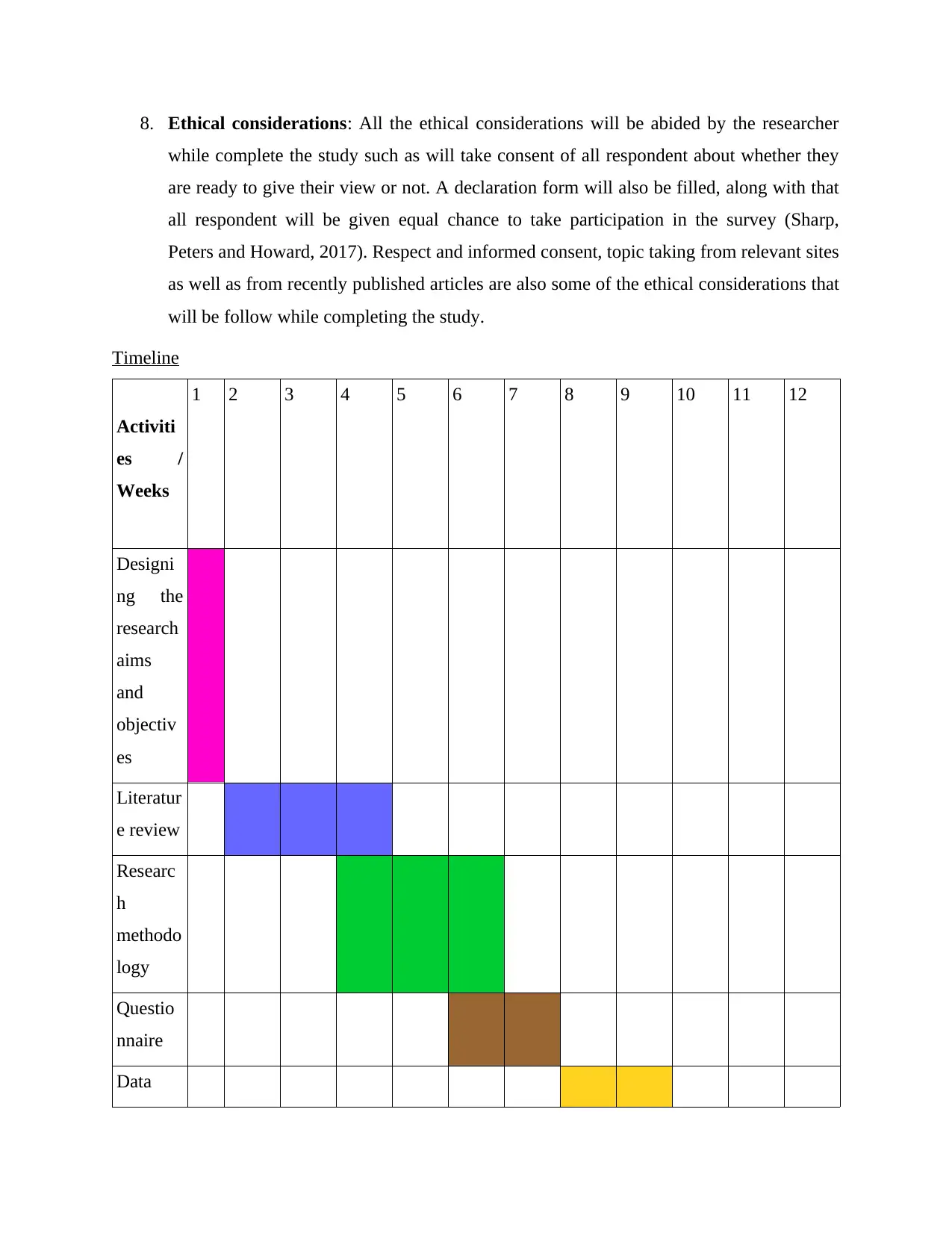
8. Ethical considerations: All the ethical considerations will be abided by the researcher
while complete the study such as will take consent of all respondent about whether they
are ready to give their view or not. A declaration form will also be filled, along with that
all respondent will be given equal chance to take participation in the survey (Sharp,
Peters and Howard, 2017). Respect and informed consent, topic taking from relevant sites
as well as from recently published articles are also some of the ethical considerations that
will be follow while completing the study.
Timeline
Activiti
es /
Weeks
1 2 3 4 5 6 7 8 9 10 11 12
Designi
ng the
research
aims
and
objectiv
es
Literatur
e review
Researc
h
methodo
logy
Questio
nnaire
Data
while complete the study such as will take consent of all respondent about whether they
are ready to give their view or not. A declaration form will also be filled, along with that
all respondent will be given equal chance to take participation in the survey (Sharp,
Peters and Howard, 2017). Respect and informed consent, topic taking from relevant sites
as well as from recently published articles are also some of the ethical considerations that
will be follow while completing the study.
Timeline
Activiti
es /
Weeks
1 2 3 4 5 6 7 8 9 10 11 12
Designi
ng the
research
aims
and
objectiv
es
Literatur
e review
Researc
h
methodo
logy
Questio
nnaire
Data
Paraphrase This Document
Need a fresh take? Get an instant paraphrase of this document with our AI Paraphraser
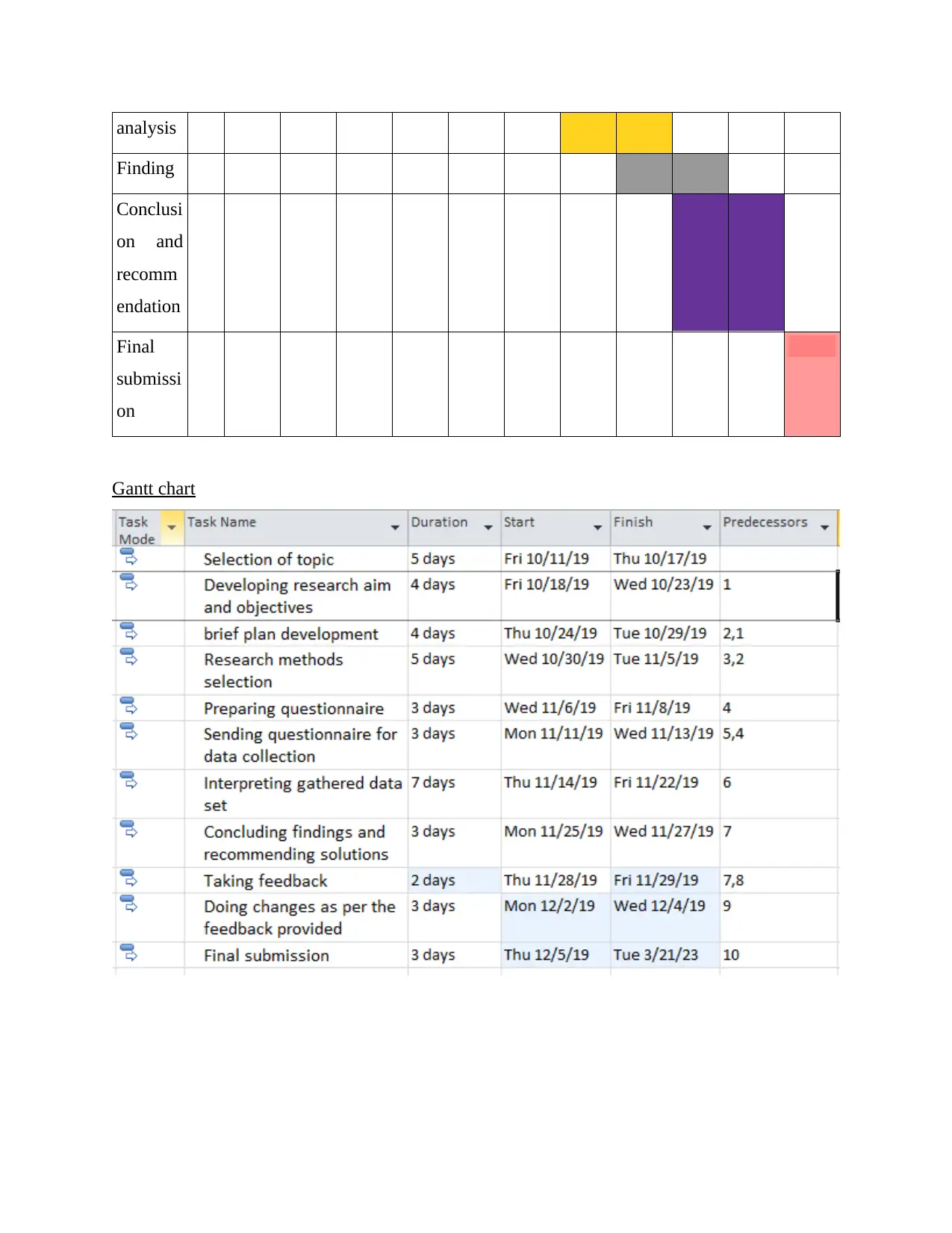
analysis
Finding
Conclusi
on and
recomm
endation
Final
submissi
on
Gantt chart
Finding
Conclusi
on and
recomm
endation
Final
submissi
on
Gantt chart
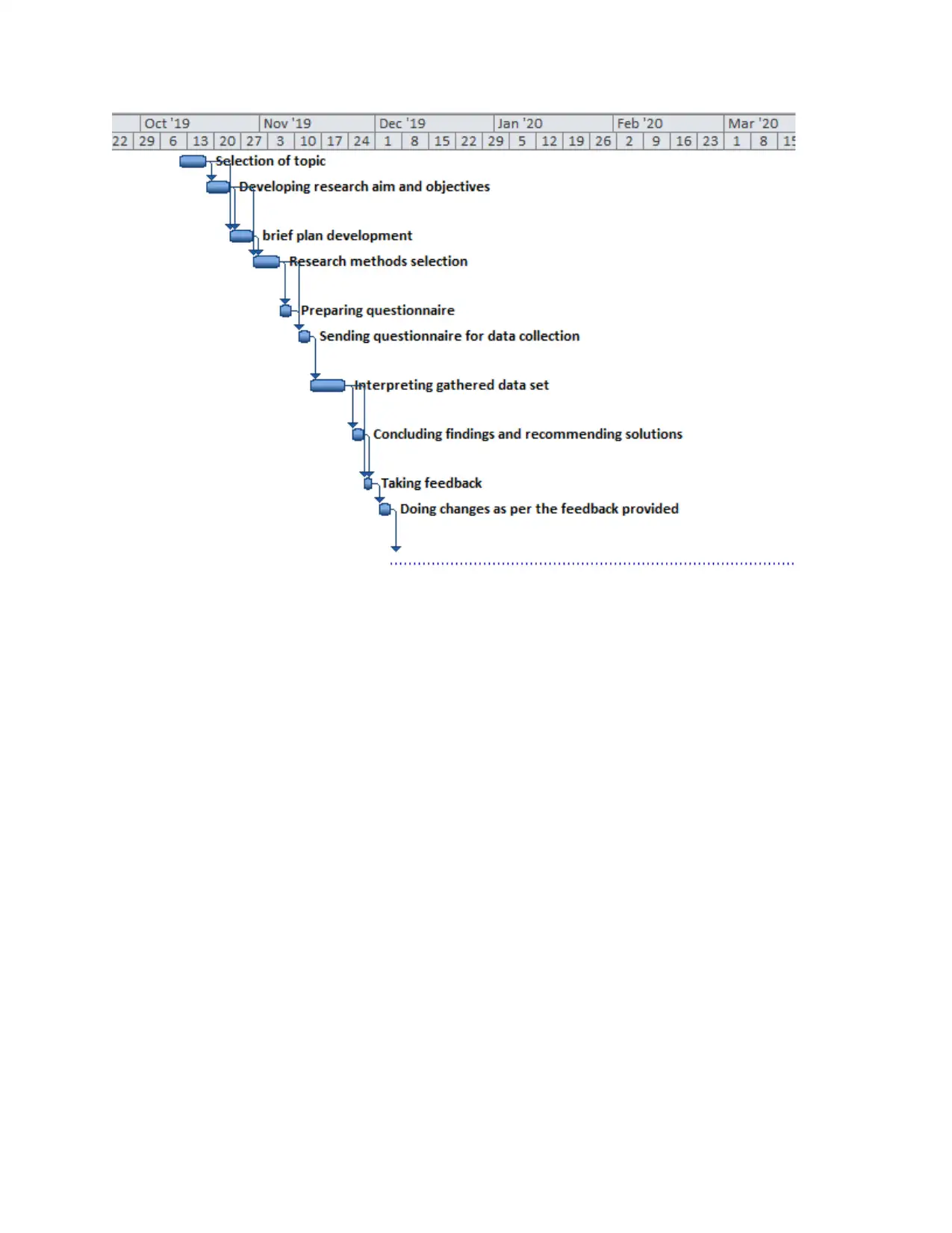
⊘ This is a preview!⊘
Do you want full access?
Subscribe today to unlock all pages.

Trusted by 1+ million students worldwide
1 out of 14
Related Documents
Your All-in-One AI-Powered Toolkit for Academic Success.
+13062052269
info@desklib.com
Available 24*7 on WhatsApp / Email
![[object Object]](/_next/static/media/star-bottom.7253800d.svg)
Unlock your academic potential
Copyright © 2020–2025 A2Z Services. All Rights Reserved. Developed and managed by ZUCOL.





